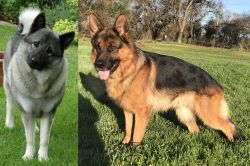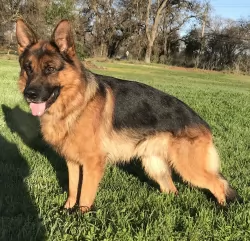 MyDogBreeds
MyDogBreeds Norwegian Elkhound is originated from Norway but German Shepherd is originated from Germany. Norwegian Elkhound may grow 12 cm / 4 inches shorter than German Shepherd. Norwegian Elkhound may weigh 19 kg / 41 pounds lesser than German Shepherd. Both Norwegian Elkhound and German Shepherd has almost same life span. Norwegian Elkhound may have less litter size than German Shepherd. Norwegian Elkhound requires Moderate maintenance. But German Shepherd requires Low maintenance
Norwegian Elkhound is originated from Norway but German Shepherd is originated from Germany. Norwegian Elkhound may grow 12 cm / 4 inches shorter than German Shepherd. Norwegian Elkhound may weigh 19 kg / 41 pounds lesser than German Shepherd. Both Norwegian Elkhound and German Shepherd has almost same life span. Norwegian Elkhound may have less litter size than German Shepherd. Norwegian Elkhound requires Moderate maintenance. But German Shepherd requires Low maintenance
 The Norwegian Elkhound is an ancient spitz-type dog breed hailing from Norway and with a history that goes back thousands of years.
The Norwegian Elkhound is an ancient spitz-type dog breed hailing from Norway and with a history that goes back thousands of years.
These dogs have been used as hunting dogs and have been able to bring down game such as Elk, bears, wolves, badgers and reindeer. They have also been used to guard livestock.
The Norwegian Elkhound was recognized by the American Kennel Club in 1913.
 In 1882 german shepherd was introduced in a show at Hanover. They were created
by the cross breeding of the rural sheep dogs by a man named Max. In 1906 they were first
exported to America. After that the breed became very popular in UK.
In 1882 german shepherd was introduced in a show at Hanover. They were created
by the cross breeding of the rural sheep dogs by a man named Max. In 1906 they were first
exported to America. After that the breed became very popular in UK.
 The Norwegian Elkhound is a medium to large sized dog standing at roughly 45 to 55cm in height and weighing anything fro 18 to 25 kilogams.
The Norwegian Elkhound is a medium to large sized dog standing at roughly 45 to 55cm in height and weighing anything fro 18 to 25 kilogams.
People love this dog because of his beautiful wolf-like face and bright eyes. The head is broad and wedge-shaped, the eyes dark brown, the ears stand erect and the bush tail curls over the dog's back.
The double coat has different shades of gray and silver with cream and white shades on the undercoat.
He is a moderate shedder with some seasonal shedding.
The Norwegian Elkhound is a high energy dog who loves to be busy and he also makes a loving and loyal companion towards his human family. He tends to be a little bit reserved around strangers.
He is an independent dog so so its a good idea to have him trained and socialized so that he is always obedient. He is an intelligent dog so you won’t battle to teach him.
He gets on well with children in the home. He however, can be a little bit aggressive with other dogs, but not if he was brought up with them as a puppy. Adventurous and active, he just loves spending time outdoors. It's why he is best suited to life in the countryside as opposed to the city and also prefers cooler climates.
 The GSD is very good for being a watchdog and hence it do not welcome guests to home.
But when trained from a puppy it will suit itself for making new friends. GSD like to be
always with somebody and they can be its master or his family members or else its partner.
The GSD is very intelligent and active hence they should be always kept busy, exercised
and playing. Nowadays many of them are trained well and made as four legged stars.
The GSD is very good for being a watchdog and hence it do not welcome guests to home.
But when trained from a puppy it will suit itself for making new friends. GSD like to be
always with somebody and they can be its master or his family members or else its partner.
The GSD is very intelligent and active hence they should be always kept busy, exercised
and playing. Nowadays many of them are trained well and made as four legged stars.
When we see all around the world many of them are involved in helping the physically challenged people. Also they are very important personnels in working with police and military for finding the criminals. Their excellent sniffing power works very good when given proper training for finding illegal smuggling. But basically the breed was set in to herd the sheep and protect them from predators.
Based on the popularity they are ranked 2nd in US and 4th in UK.
 Your Norwegian Elkhound makes an awesome pet. He is full of the joys of living and wants to be an active member of his human family.
Your Norwegian Elkhound makes an awesome pet. He is full of the joys of living and wants to be an active member of his human family.
He is active and always ready for some fun and games. He is also intelligent and will make an even better pet when he has been trained and socialized.
Those who have owned one of these beautiful dogs will always say how they adore this beautiful, smart, loving canine friend of theirs.
 The GSD is a very good child friendly dog, they love to play with kids.
The GSD is a very good child friendly dog, they love to play with kids.
They adopts both hot and cold climates, but they like cold weather very much and also their body is suitable for cold than hot.
The GSD has high ability to learn tricks and also they are interested in learning. As they have very high intelligence they learn very easily and quickly.
 Your beautiful Norwegian Elkhound can reach 15 years of age if you look after him well and he manages to avoid some of the common dog diseases there are.
Your beautiful Norwegian Elkhound can reach 15 years of age if you look after him well and he manages to avoid some of the common dog diseases there are.
There are some dog illnesses that are good to be aware of -
This is an eye condition where there is pressure that builds up in the eye. There is a problem with the drainage of fluid in the eye and this is what causes the pressure and there can be damage to the optic nerve.
This is a skin condition that causes inflammation and is often seen in dogs like the Norwegian Elkhound who have thick coats.
A common disease seen in many dog breeds, young and old, and which is a malfunction of the hip joints, causing problems with your dog’s mobility.
 The GSD has the chances for getting orthopaedic diseases such as hip dysplasia
and elbow dysplasia. Other common orthopaedic problems which affects GSD are Panosteitis,
Osteochondritis and cruciate ligament rupture.They also get some skin problems such as
allergies and pyoderma. Digestive problems such as chronic diarrhea and colitis are
also seen in GSD.
The GSD has the chances for getting orthopaedic diseases such as hip dysplasia
and elbow dysplasia. Other common orthopaedic problems which affects GSD are Panosteitis,
Osteochondritis and cruciate ligament rupture.They also get some skin problems such as
allergies and pyoderma. Digestive problems such as chronic diarrhea and colitis are
also seen in GSD.
GSD is a continuous shedder. They are having a two layer coat. They should be brushed daily as it will remove the dead fur and thus prevents shedding.
 As a spitz type dog, the Norwegian Elkhound is an energetic dog who will need lots of physical activity.
As a spitz type dog, the Norwegian Elkhound is an energetic dog who will need lots of physical activity.
He has a very thick coat so make sure he doesn’t overheat during exercise as he has been used to living in wintry climates.
Your pet will shed some of that thick hair so he will need to be brushed at least twice a week to keep the coat in tip top condition. At the same time check him over for ticks and fleas. How often you see ticks on your dog will depend on where you live. These parasites attach to your dog and feed on his blood.They are capable of causing many diseases in your pet, one of which is Lyme disease, a disease which can lead to arthritis and swelling with your dog’s joints.
The best way to prevent any disease from weakening your pet is to get him to the vet as soon as possible. A good way to prevent ticks is to speak to your vet about tick control products.
Make sure he has the best food to ensure health and happiness. Keep his meals simple – no exotic, spicy foods that can upset his stomach.
A high quality kibble brand for energetic dogs is a wise choice and some tasty home-made food added in occasionally. This can be boiled chicken, brown rice and vegetables. Never leave him without a constant supply of fresh, cool water.
 The GSD should be given an cool environment which they will enjoy a lot.
The GSD should be given an cool environment which they will enjoy a lot.
The GSD puppy should be fed small quantities of food but several times per day as it needs to gain 2 gms weight per day. The preferred food for them is dry food along with raw liver pieces which would provide them excellent energy. The protein food given to puppy should contain 25 to 30% calories. Puppies consume more food when compared with adults.
The GSD needs a food which has a considerable amount of protein. They are carnivores in the nature. The protein can be given from cooked meat. The artificial food products will not be suitable for them. When are provided with protein food they will gain fat from itself. The recommended fat content for GSD is 5% to 8%.
The GSD should be provided with a nutritional food for their good health.
Physical exercises are very much needed for GSD since they are very energetic and power packed. It is highly recommended to make them play and run daily as they don't need to get bored. They can be made to climb in hilly areas as they want to explore their surroundings. They can be made to swim or play hide and seek and find the missing objects. Regular morning walk will be very good for them.